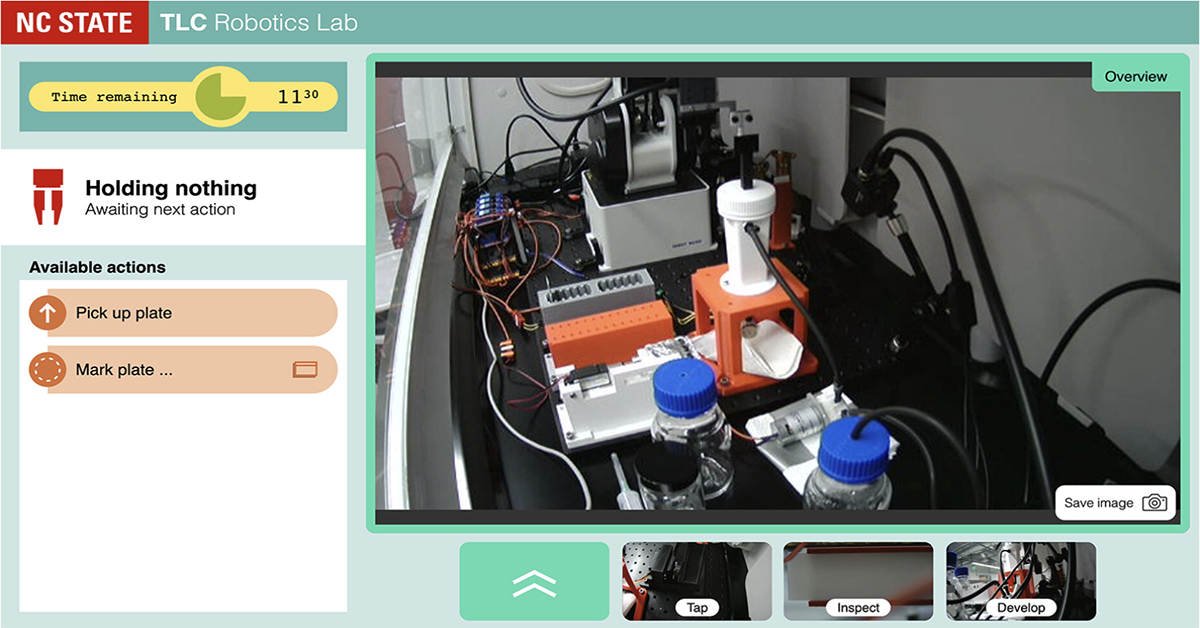
Ch 222: Using Robotics to Create a True Distance Organic Chemistry Lab Experience for Undergraduates
CH 222: Organic Chemistry I is the laboratory experience accompanying CH 220 or CH 221 that provides an introduction to basic organic laboratory equipment and techniques. While lab experiences are an important part of the learning experience, for many students, lab environments can be stressful. For example, some students might be interacting with unfamiliar equipment in a lab with time constraints, which can be intimidating. Other students might not have access to the lab due to military deployment or accessibility challenges, or because they are distance learners. And for some students, working within a lab environment might be potentially harmful due to a physical condition or chemical sensitivity. Professor of Materials Science and Engineering Aram Amassian and Associate Professor of Chemistry Ryan Chiechi sought to make this lab more accessible by adapting an existing Virtual Reality (VR) activity lab assignment into one that allows students to participate remotely by using a robotic arm in place of their hands. During the 2022-23 academic year, Amassian and Chiechi turned to DELTA for support by applying for one of DELTA’s Exploratory Grants to turn their vision of remote lab work into reality for their students.
Instructional Challenges
- Identifying a lab assignment that was well-suited for fully remote learning
- Ensuring the assignment did not pose any safety hazards
- Making sure no specialized or sophisticated equipment was needed to complete the work
- Creating a virtual approach that mimics an authentic lab experience and provides instructionally meaningful content, for example, addressing user mistakes or allowing key decision points.
Highlights/Solutions
- Adapted the Thin Layer Chromatography (TLC) lab because it was well-suited for remote work. The results depend heavily on the physical manipulation of capillary tubes and the quality of the resulting TLC directly relates to variables associated with the physical preparation and manipulation of real-world objects.
- Solution allowed students to engage in the trial and error that is fundamental to learning how to prepare and interpret TLC (a technique that is central to organic chemistry) results.
- Ensured that TLC did not pose any safety hazards and did not require specialized or sophisticated equipment, which will facilitate scaling and disseminating the adapted laboratory course.
- Explored and demonstrated the capabilities of robotics in the lab to mimic an authentic experience for students.
- Created a virtual approach that mimics an authentic lab experience and provides instructionally meaningful content, for example following user mistakes or allowing key decision points.
- Established a secure, authenticated and extensible API connection between a dedicated lab computer and a purpose-built TLC workstation with an integrated robotic arm in the lab.
- Designed a user interface that provides for visualization and interaction with the TLC workstation and the robotic arm.
Related Links
- Students Use Robotics to Complete Organic Chemistry Lab
- The Rob-O-Chem Laboratory
- UNC System Learning & Technology Newsletter (February 2024)
- NC State uses Rob-O-Chem lab, allowing organic chemistry students to conduct experiments from anywhere
For more information about DELTA services, please contact LearnTech.